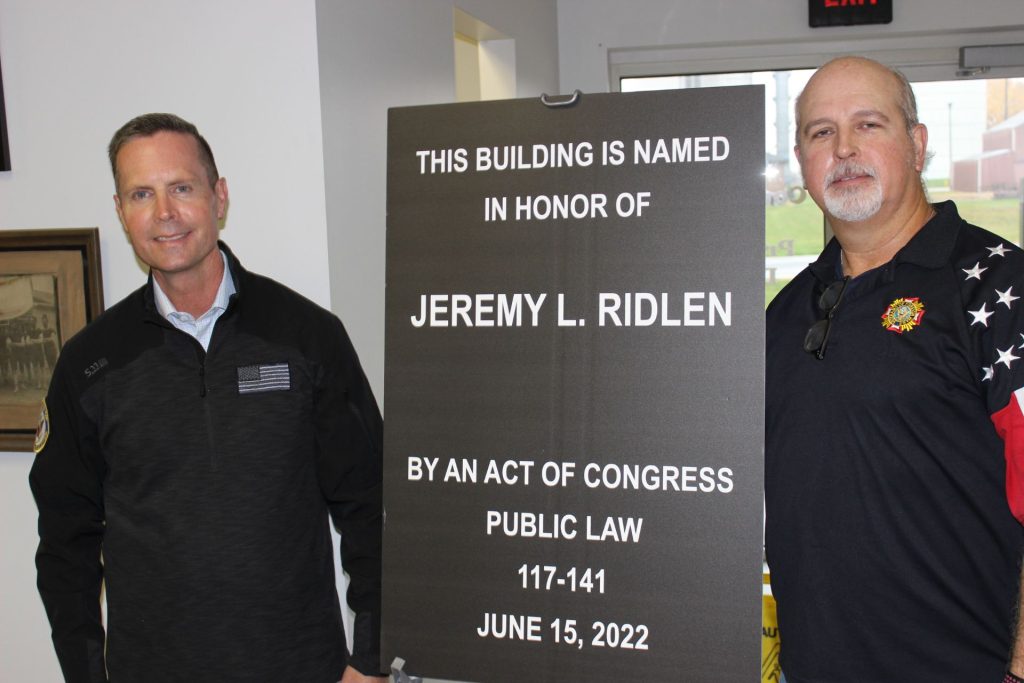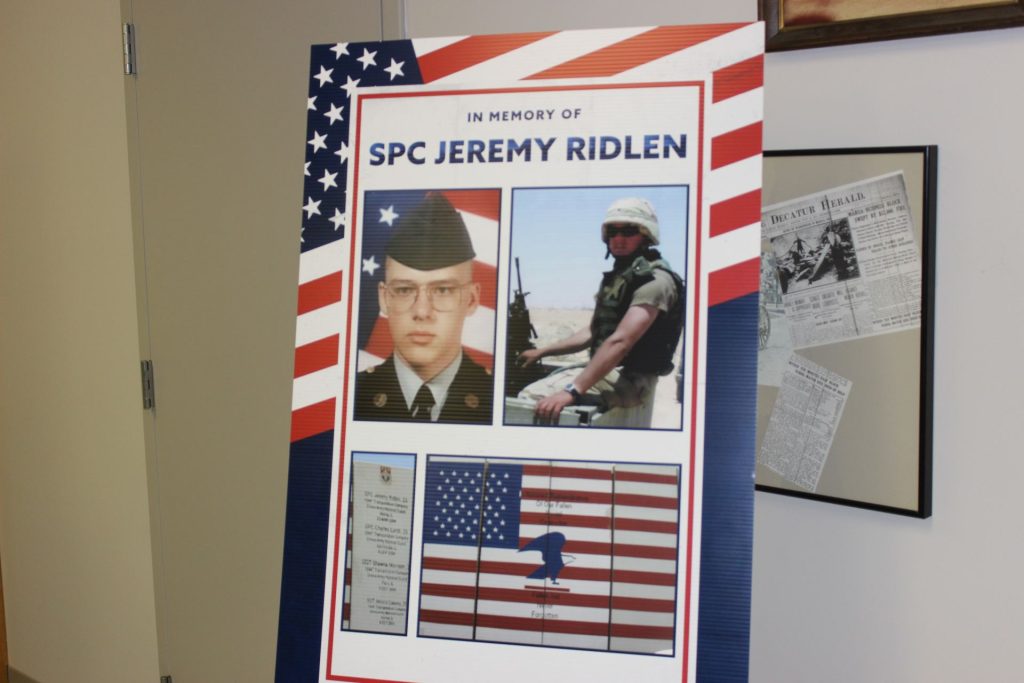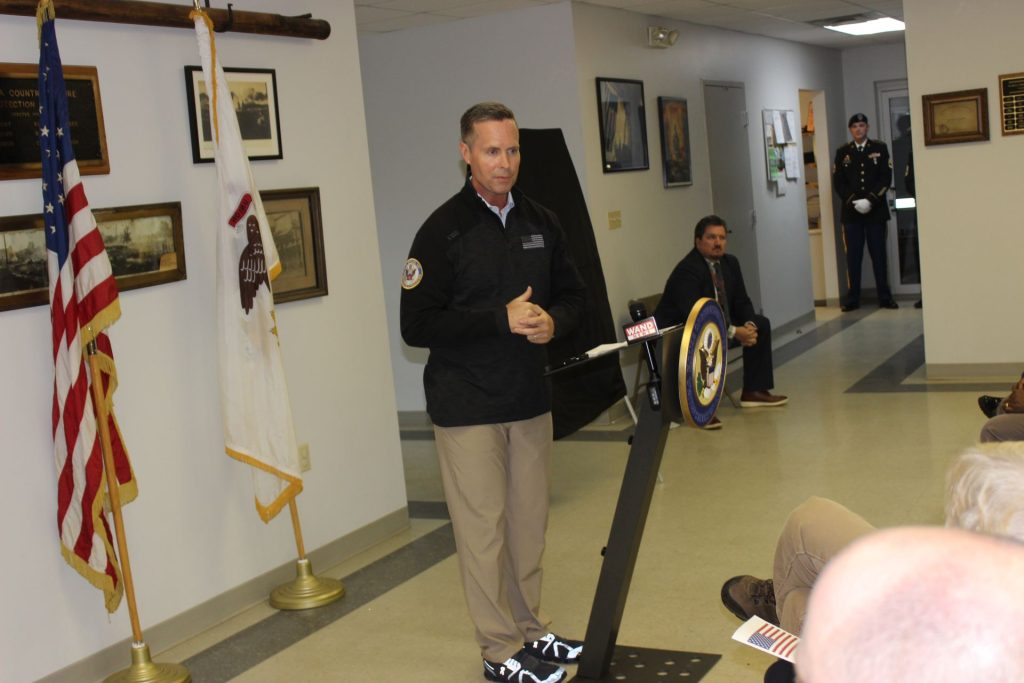
On the rainy morning of October 25, in his invocation to begin the solemn ceremony of dedicating the post office in the small town of Maroa in Macon County to the memory of a fallen soldier, the Rev. Scott Marsh of Maroa Christian Church, told those gathered that it was his prayer that “we never forget.”
In the audience were the soldier’s family, friends, military colleagues, local and state leaders from the United States Post Office, and U.S. Rep. Rodney Davis.
Davis, speaking at the ceremony held in the local fire station, did his part to keep the memory of a lost local son alive as he put the final touch on a bill, House Resolution 3759, that he had introduced on the House floor on February 1. Davis’ bill to rename the United States Post Office in Maroa as the Jeremy L. Ridlen Post Office passed unanimously and was signed into law by President Joe Biden on June 15.
“I hope today is just one day that we as a community and we as a country can honor the sacrifice that you and your entire family have gone through,” Davis said as he spoke directly to the Ridlen family. “This is just one small token of our appreciation to Jeremy Ridlen and the many brave men and women in our military and in our country who have stood up to protect our freedoms and protect our liberties and each and every one of us.”
Ridlen, an Army specialist, and twin brother Jason, both former Illinois State University students, joined the Illinois National Guard in 1998 after graduating from Maroa-Forsyth High School. They were assigned to the 1544th Transportation Company in Paris. In December 2003, they were among 170 soldiers from their unit deployed as part of Operation Iraqi Freedom. Their unit was based at Log Base Seitz, one of the most mortared bases in Iraq at that time, near Abu Ghraib.
Ridlen, a gunner protecting a convoy that delivered the mail, among other duties, was killed by small arms fire on May 23, 2004, when a truck at the side of the road detonated as they passed by. He was 23 years old.
Troy Luster ’07 was part of Ridlen’s unit and was at the wheel that day. He said Ridlen was alive after the explosion. He should know since he pulled his friend out of what was left of their vehicle. Almost two decades later, Luster, now a public defender in Arizona, still recalls Ridlen’s bravery.
“There’s no doubt that Jeremy survived the blast because he was alive when I got him out of the truck, and bullets impacted all across our windshield,” Luster said. “Jeremy died, in my opinion, while protecting the three other soldiers in his truck—me being one of them.”
Davis had said when he introduced the legislation in February that designating the post office in Ridlen’s memory would honor him and “serve as a testament to his bravery and a reminder of all those who laid down their life for the United States of America.”

The idea to honor Ridlen began years before Davis’ Washington speech when another Illinois State alum, retired U.S. Army Lt. Col. James Keith ’86, M.S. ’10, noticed Ridlen’s name on a piece of wall art outside of a post office at a base in Iraq.
“I was stationed in Iraq in 2011 outside Balad at one of the largest posts in Iraq,” Keith said. “I went to mail a letter at the Joint Base Balad Post Office. There are these concrete walls that protect from shrapnel and missile and mortar attacks. Anyway, you can Google ‘Iraq wall art’ and see how those who have fallen are honored. In the upper, right-hand corner of the entrance, there was his name.”
Keith, who lives in Maroa, served 29 years in the military after enlisting in the U.S. Army’s Officer Candidate School after one year of graduate school at Illinois State. From 2000-2013, he was an assistant professor of military science in Illinois State’s ROTC program. He was moved by the unexpected sight of a familiar name from back home.
“Here I’m half a globe away and see a memorial to a kid from Maroa,” Keith said. “The next few years I was very busy with the military before I could do something about honoring him, but I never forgot.”
Davis told the Maroa gathering that he recalled the moment he met Keith after a Chamber of Commerce breakfast in Decatur about four years ago.
“I want to give a special thanks to the guy who started this process involving me and my team in our office, and that’s James Keith,” Davis said, pointing out Keith in the back of the room. “James came up to me and said, ‘What do we do about honoring Jeremy Ridlen?’
“James, I hope that one small token of my appreciation that I can give you today is to thank you for bringing this to our attention.”
Davis said that he had met presidents in the Oval Office, met kings and world leaders but taking a constituent’s idea and turning into a piece of legislation that passes through the House and Senate and then is signed into law by the president was one of the highlights of his career. He described Keith’s idea as a way to “honor those heroes who walk among us and who grew up among us.”
Keith did not know the Ridlens when they were at Illinois State, but Luster was one of his former students, and he knew him well.
“Troy is an integral part of this story,” Keith said. “He was one of my cadets. Hero is an overused word, but he is one of my personal heroes. His leadership potential was amazing. I offered him the option of being an officer, but he declined. He could’ve deferred deployment, but he deployed with his unit. They were a closeknit unit.
“When the IED (improvised explosive device) hit them, a projectile went through Troy’s window, and how it missed him I don’t know,” Keith said after seeing photos of the aftermath. “He literally pulled his buddy out of the wreckage. Troy was temporarily deafened by the IED blast. You have two ISU alums, one wounded, one dead, but one went to the aid of his brother in arms who was killed in action.”
Davis reminded the audience that the Ridlen brothers were twins and that they were inseparable, both going to Illinois State and even deploying together.

“This hits home for me because I have identical twin boys at Illinois State right now,” he said. “And I could not imagine the loss that you and your entire family have experienced in losing your twin brother, in losing your son, in losing your sibling.”
Just before unveiling the plaque in memory of their loved one, Davis ended his remarks by thanking the Ridlen family for their sacrifice: “Thank you for allowing us to honor him today. God bless you.”
Luster was emotional in his response to Keith’s words about his actions in helping his friend.
“James called me a hero, and I’m humbled and deeply moved by him acknowledging my efforts that day,” he said. “To say that means a lot to me would be an immense understatement because for years it felt like our story was overlooked or forgotten.
“I would respond by saying there were many heroes that day, including the two other soldiers in my truck, the Marine corpsman who responded, and most importantly, Jeremy Ridlen.”
